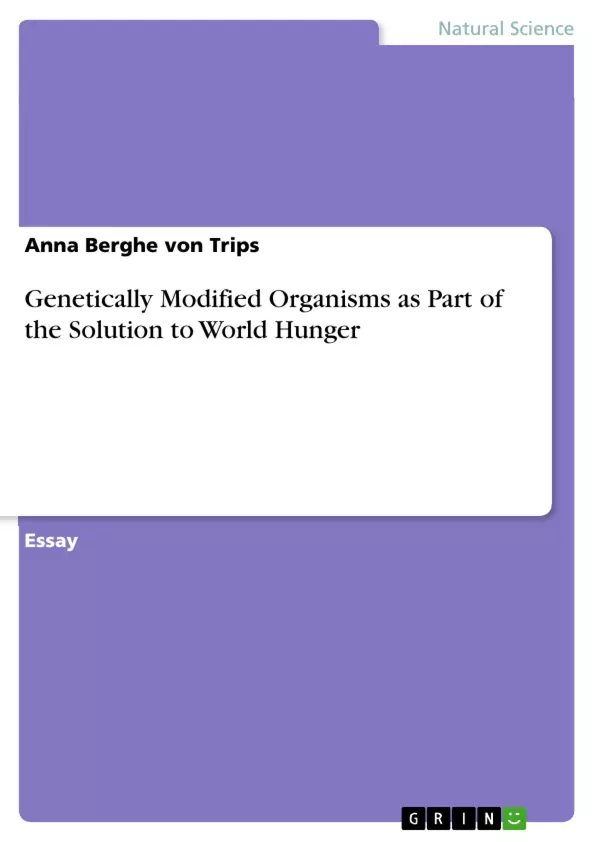Genetically modified organisms (GMOs) continue to be discussed as a possible solution for world hunger. At the same time there are continuous debates on whether they are socially desirable.
The essay discusses the three following questions regarding the development of this technology and which responsibilities for science, technology, and society this entails: What are the ethical foundations for the development of GMOs and are they driven by the economy? How do we enable the development of GMOs without a Eurocentric focus? How can GMOs support the transformation towards a sustainable agriculture?
In the end it tries to give an answer how researchers, policymakers, industry leaders, and civil society should respond to this challenge.
Inhaltsverzeichnis (Table of Contents)
- Essay Question: GMOs - A solution for world hunger or a socially erroneous development?
- The Problem with GMOs
- Essential Questions
- What are the ethical foundations for the development of GMOs and are they driven by the economy?
- How do we enable the development of GMOs without a Eurocentric focus¹?
- How can GMOs support the transformation towards a sustainable agriculture?
- GMOs - a solution for world hunger?
Zielsetzung und Themenschwerpunkte (Objectives and Key Themes)
This essay aims to critically examine the role of Genetically Modified Organisms (GMOs) in addressing global food security and its ethical, social, and environmental implications. It explores the underlying economic motivations driving GMO development and calls for a shift towards a more ethically grounded and inclusive approach.
- Ethical considerations in GMO development and the influence of economic interests.
- The need for a shift from a Eurocentric focus in GMO research to a more diverse and inclusive approach.
- The potential of GMOs to contribute to sustainable agriculture and food security.
- The role of public awareness and communication in shaping public opinion on GMOs.
- The potential for GMOs to address global challenges, such as food security and climate change.
Zusammenfassung der Kapitel (Chapter Summaries)
- The essay begins by introducing the topic of GMOs and highlighting the complex relationship between new technologies and societal acceptance. It discusses the extensive testing and regulatory processes required for GMOs but emphasizes the limitations of these measures in assessing long-term effects. The author then outlines several points that contribute to concerns surrounding GMOs, including the role of multinational companies, the impact on biodiversity, and the potential for monoculture practices.
- The author explores the ethical foundations of GMO development, arguing that the current economic driven approach is insufficient. They advocate for an ethically grounded approach that prioritizes societal well-being and environmental sustainability. The essay emphasizes the importance of including all affected parties, particularly young generations and communities in the Global South, in the development of ethical guidelines for GMOs.
- The author critiques the Eurocentric focus in GMO research and development, arguing for a more diverse and inclusive approach that addresses the needs of the global population. They highlight the importance of understanding local contexts and incorporating diverse perspectives in tackling global challenges such as water scarcity.
- The essay discusses the potential of GMOs to support a transformation towards a sustainable agriculture. It proposes strategies for achieving this goal, including the adoption of open-source technologies, regulations focused on long-term effects, and neutral research. The author emphasizes the need for open communication between researchers and the public to foster understanding and acceptance.
Schlüsselwörter (Keywords)
This essay focuses on the complex relationship between GMOs, food security, ethical considerations, Eurocentric focus, sustainable agriculture, and the influence of economic interests. It examines the need for a shift towards a more responsible and inclusive approach to GMO development, considering long-term societal and environmental impacts.
- Quote paper
- Anna Berghe von Trips (Author), 2019, Genetically Modified Organisms as Part of the Solution to World Hunger, Munich, GRIN Verlag, https://www.hausarbeiten.de/document/497979


